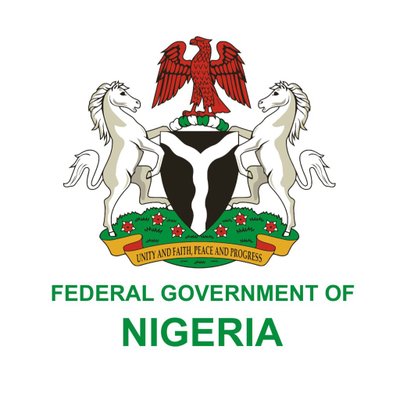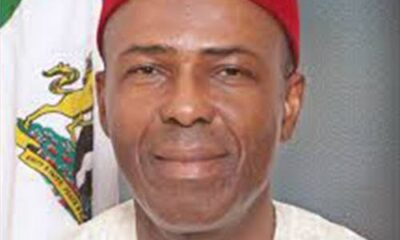Top Story
Seplat/ExxonMobil deal: Buhari orders investigation into alleged $100m bribe
…As President backs deal’s rejection by regulator
By Uthman Salami
President Muhammadu Buhari has ordered immediate investigation into an allegation of $100 million bribe shared among top officials, which was reportedly done to scurry favour from the Federal Government’s in order to approve Seplat Energy Plc’s acquisition of shares and Mobil Producing Nigeria Unlimited (MONU).
Recall that the earlier botched approval in the share acquisition deal between Seplat Energy Plc and Mobil Producing Nigeria Unlimited (MPNU) was reportedly uncovered by the presidency, this is in accordance with the Persecondnews.
The largesse was reportedly shared amongs echelon officials of the Presidency directed at shortchanging the due process which almost led to the purported approval announced by President Muhammadu Buhari.
According to a report by Persecondnews the President, having felt embarrassed by the development ordered for the Department of State Service (DSS) to investigate the matter.
Meanwhile, having understood he had been hoodwinked, Buhari has ordered reversal of his earlier authorisation of Seplat Energy’s takeover of ExxonMobil’s shallow water business in Nigeria, throwing his weight instead behind the regulator’s decline of the $1.3 billion transaction.
The President decided the position of the Nigerian Upstream Petroleum Regulatory Commission (NUPRC) is to be supported, and the earlier confusion was because “Various agencies involved in (the) decision had not coordinated well among themselves.”
According to the Premium Times, “It has become clear that the various agencies involved in the decision had not coordinated well among themselves and having looked at all of the facts with all of the ramifications, the president decided the position of the regulator is to be supported,” Spokesperson Garba Shehu said.
Earlier, the Presidential Spokesperson, Femi Adesina had said Buhari had approved the sale to Seplat.
He claimed the President’s approval was in his capacity as Minister of Petroleum Resources and the approval was in consonance with the country’s drive for Foreign Direct Investment in the energy sector and considering the “Extensive benefits of the transaction to the Nigerian Energy sector and the larger economy.”
In a swift reaction, the Nigerian Upstream Petroleum Regulatory Commission (NUPRC) said the proposed takeover of Mobil Producing Nigeria Unlimited by Seplat Energy was a regulatory matter and it had notified ExxonMobil the transaction could not go through.
“As it were, the issue at stake is purely a regulatory matter and the Commission had earlier communicated the decline of Ministerial assent to ExxonMobil in this regard. As such the Commission further affirms that the status quo remains,” the CEO of the Commission, Gbenga Komolafe said.
“The Nigerian Upstream Petroleum Regulatory Commission (NUPRC) affirms that status quo remains in respect of ExxonMobil/Seplat Energy share acquisition.
“Responding to media enquiries on latest development about the transaction, the Chief Executive of the NUPRC Engr. Gbenga Komolafe clarified that the Commission in line with the provisions of the Petroleum Industry Act 2021 is the sole regulator in dealing with such matters in the Nigerian upstream sector.
Recall that the right over the assets had been secured by the Nigerian National Petroleum Company Ltd while it has also in July won a court decision temporarily blocking Exxon Mobil Corporation from selling assets in Nigeria to Seplat Energy Plc.
Also, a federal high court judge in Abuja had granted NNPC an “Order of interim injunction” on July 6, 2022, barring ExxonMobil “from completing any divestment” in a unit that ultimately operates four licenses in Nigeria.
NNPC had prayed the State High Court of the Federal Capital Territory, to declare that a conflict happened between the state-owned oil company and MPNU over the “interpretation of preemption rights under their Joint Operating Agreement (JOA) and order NNPC and MPNU to arbitration as required by the JOA.”
Seplat Energy claimed neither itself nor Seplat Energy Offshore Limited was a party in the lawsuit, insisting the share purchase agreement remained valid.
The asset purchase would enable Seplat Energy to scale up production by 95,000 barrels of oil a 7day from assets in a joint venture ExxonMobil runs with NNPC.
After the President declined Seplat’s bid in favour of NNPC last week, it was shocking when the now botched approval was announced by the President, a move many stakeholders in the industry said it was counterproductive to the NNPC limited new status in the industry.
Top Story
FG set to sell DisCos to reputable operators in three months — Adelabu


The Minister of Power, Chief Adebayo Adelabu, has said that the federal government would sell off the five electricity Distribution Companies (DisCos) now under the management of banks and Asset Management Company (AMCON) in the next three months to reputable technical power operators.
Adelabu disclosed this to the members of the Senate Committee on Power who were on an oversight visit to the ministry in Abuja.
The Minister added that the energy distribution assets are technical and as such, they should be under the management of technical experts.
As it stands, Abuja Electricity Distribution Company (AEDC) is currently under the management of the United Bank of Africa (UBA), Fidelity Bank manages Benin Electricity Distribution Company, Kaduna Electricity Distribution Company, and Kano Electricity Distribution Company while Ibadan Electricity Distribution Company is under the AMCON management.
They all found themselves under the new management arrangement owing to their inability to repay their loans.
He informed the committee that tough decisions on the DisCos have become necessary because the entire Nigerian Electricity Supply Industry (NESI) fails when they refuse to perform.
According to him, the ministry will prevail on the Nigerian Nigerian Electricity Regulatory Commission (NERC) to revoke underperforming licenses and also change the management board of the DisCos if it becomes the solution.
Adelabu said, “Lastly, on distribution. Very soon you will see that tough decisions will be taken on the DisCos. They are the last lap of the sector. If they don’t perform, the entire sector is not performing.
“The entire ministry is not performing. We have put pressure on NERC, which is their regulator to make sure they raise the bar on regulation activities.
“If they have to withdraw licenses for non-performance, why not? If they have to change the board of management, why not?
“And all the DisCos that are still under AMCON and Banks, within the next three months, they must be sold to technical power operators with good reputations in utility management.
“We can no longer afford AMCON to run our DisCos. We can no longer afford the banks to run our DisCos. This is a technical industry and it must be run by technical experts.”
The Minister also noted that it has become necessary to reorganise the DisCos for efficiency.
He stressed that Ibadan DisCo is too large for one company to manage.
Top Story
Five arrested for attacking, injuring four LASTMA officers


…Operational vehicles damaged
…54 trucks impounded for illegal parking
Five miscreants have been arrested for assaulting and injuring LASTMA personnel during an enforcement operation in the Oba Akran Avenue area of Ikeja, Lagos and the state government has finalised preparations to prosecute them
Firector of Public Affairs and Enlightenment of LASTMA, Mr. Adebayo Taofiq, disclosed this in a press statement made available to journalists on Thursday.
According to him, April 23, LASTMA operatives conducted an operation to remove illegally parked Viju Milk trucks on Oba Akran Avenue in response to numerous complaints from the public about the trucks causing traffic congestion.
During the operation, four LASTMA officers sustained serious injuries from weapons wielded by Viju Milk truck drivers and local miscreants.
“While LASTMA operational vehicles were vandalised, 54 Viju Milk truck were evacuated by LASTMA during the enforcement operations.”
He said, “The police, working alongside LASTMA, arrested five of these individuals namely: Falomo Oluwafemi, Afeniyi Stephen, Olamide Adekunle, Chukwu Guaja Eze and Adeshina Sulaimon, seized various weapons including broken bottles, iron rods, charms, knives, and cutlasses.”
The injured LASTMA officers were promptly taken to the hospital for medical attention.
Hon. Sola Giwa, the Special Adviser to the Governor on Transportation, stated that the arrested individuals would be prosecuted by the government as a deterrent to others.
Top Story
Hardship: FG kicks off N100bn consumer credit scheme


…Civil servants to benefit in first phase
By Grace Olatundun
The Federal Government of Nigeria has kicked off the N100 billion Consumer Credit Scheme for Nigerians as a tool to alleviate the escalating economic hardship in the country.
In a press statement on Wednesday by the President’s spokesperson, Ajuri Ngelale, he disclosed that interested Nigerians are expected to visit the portal of Nigerian Consumer Credit Corporation before May 15, 2024.
The President noted that the “consumer credit serves as the lifeblood of modern economies, enabling citizens to enhance their quality of life by accessing goods and services upfront, paying responsibly over time. It facilitates crucial purchases, such as homes, vehicles, education, and healthcare, which are essential for ongoing stability and the pursuit of their aspirations.
“Individuals build credit histories through responsible repayment, unlocking more opportunities for a better life. The increased demand for goods and services also stimulates local industry and job creation.”
The President stated further that every hardworking Nigerian should have access to social mobility, with consumer credit playing a pivotal role in achieving this vision.
“The Nigerian Consumer Credit Corporation (CREDICORP) achieves its mandate through the following: Strengthening Nigeria’s credit reporting systems and ensuring every economically active citizen has a dependable credit score. This score becomes personal equity they build, facilitating access to consumer credit, Offering credit guarantees and wholesale lending to financial institutions dedicated to broadening consumer credit access today and Promoting responsible consumer credit as a pathway to an improved quality of life, fostering a cultural shift towards growth and financial responsibility.
“In line with the President’s directive to expand consumer credit access to Nigerians, the Nigerian Consumer Credit Corporation (CREDICORP) has launched a portal for Nigerians to express interest in receiving consumer credit.
“This initiative, in collaboration with financial institutions and cooperatives nationwide, aims to broaden consumer credit availability.
“Working Nigerians interested in receiving consumer credit can visit www.credicorp.ng to express interest. The deadline is May 15, 2024.
“The scheme will be rolled out in phases, starting with members of the civil service and cascading to members of the public,” the statement read.
Recall that two months ago, a presidential spokesman, Bayo Onanuga, announced that the Federal Executive Council had given the nod for the establishment of the Consumer Credit Scheme.
He said the President’s Chief of Staff, Femi Gbajabiamila, will lead a committee that includes the Budget Minister, Attorney-General, and Coordinating Minister of the Economy and Finance to make the scheme a reality.
In March, the Chairman of the Federal Inland Revenue Service Chairman, Zacch Adedeji, said the Nigerian government would unveil its proposed N100 billion consumer credit loan in a few days.
-
Finance3 months ago
Court orders Sen. Victor Umeh to repay N136m bank debt to AMCON
-



 Abuja Update2 months ago
Abuja Update2 months agoUNDP, FG partnership needed to achieve inclusion, equity- Minister
-
Abuja Update1 month ago
Banks drive stock market performance with N147bn gain
-



 Health1 week ago
Health1 week agoCapacity training will reduce migration of health workers- NPHCDA
-



 Infotech4 weeks ago
Infotech4 weeks agoWorld Backup Day: NITDA urges Nigerians to ensure backup of data
-
capital market2 years ago
Rt.briscoe, FBNH, Others halts negative performance of stock market
-



 Health3 weeks ago
Health3 weeks agoImmunisation: FG, GAVI seek synergy with Sokoto Govt.
-
Infotech2 weeks ago
Forex for Beginners: Unveiling the currency exchange and how to trade it










